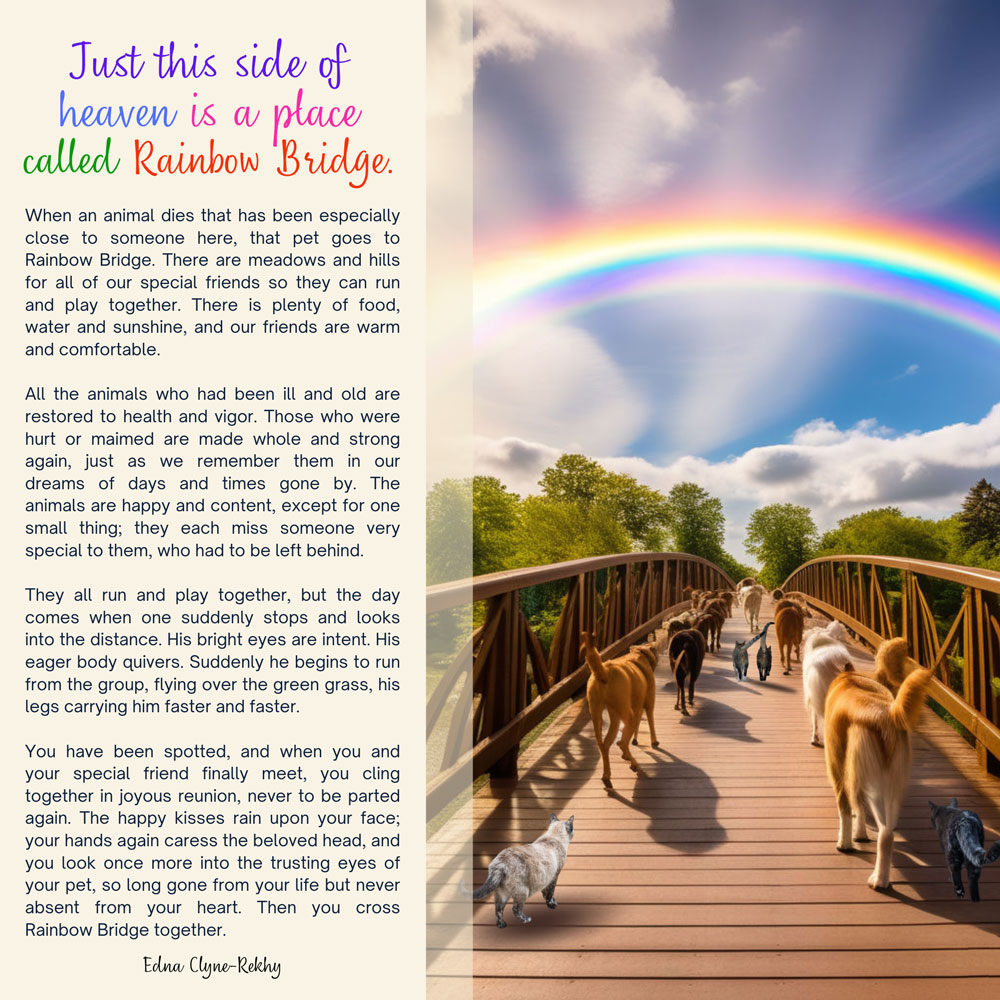Anticipated Grief Process
Anticipatory grief is the distress a person may feel in the days, months, or even
years before the death of a loved one or impending loss. Anticipatory grief can develop
from unexpected diagnoses, e.g. diabetes, cancer, paralysis, and expensive treatments.
Those experiencing anticipatory grief report feeling anxiety, dread, guilt, and an
intense preoccupation with the pet to name a few.
Please note that pet parents may also develop caregiver fatigue during this time as
well; tasks that contribute to caregiver fatigue include caring for an animal who
has accidents in the house, administering subcutaneous fluids, managing multiple medications,
and/or assisting with mobility issues. As a pet parent experiencing this kind of fatigue,
remember to give yourself grace; caregiving is exhausting! Remember that having the
associated feelings with caregiver fatigue does NOT mean you love your pet any less.
Try to prioritize your self-care, too. Lastly, do not forget the reason you are going
through all of this—the love and bond you share with your pet—so carve out time to
spend with them in a non-caregiving capacity.
THE GRIEF JOURNEY THAT STARTS BEFORE THE LOSS: ANTICIPATORY GRIEF
NAVIGATING THE EUTHANASIA DISCUSSION WITH YOUR VET
Grief Process
The grief process is widely understood through the six stages outlined by Elisabeth
Kübler-Ross. These stages are commonly experienced by most individuals and can offer
valuable insight into the emotional adjustment process, facilitating recovery. It
is important to note that these stages may not always follow a linear progression
and can fluctuate. The grieving process is unique to each individual, varying significantly
from person to person. Its duration can range from a few days to several years, depending
on one's emotional journey. The six stages are as follows:
Denial: As a natural defense mechanism, denial helps protect individuals from being overwhelmed
by news of the loss. It may present itself as numbness or a refusal to accept the
reality of the situation.
Bargaining: During this stage, individuals may engage in conscious or unconscious attempts to
regain control or reverse the loss, often through thoughts like “What if?” or “If
only…”
Anger: Anger can manifest either specifically or generally, and it can be expressed both
directly and indirectly. In the case of pet loss, this anger may often appear as guilt.
Depression: This stage is often considered the heart of the grieving process, where grief feels
most intense. It represents the emotional pain involved in accepting the loss and
letting go.
Personal Growth: This stage marks the beginning of recovery, where individuals may recognize meaning
or experience personal growth from the loss or from their pet’s life.
Acceptance and Resolution: The final stage involves accepting both the loss and the growth achieved through
the grieving process. It represents a new reality and a sense of peace with what has
transpired.
Veterinarians and mental health professionals both acknowledge that the grief response
to the loss of an animal is legitimate, and grieving a pet is a natural and valid
emotional experience.
Note: Children who are grieving the loss of a pet may struggle to express their feelings,
either due to their age or because they are unwilling to verbalize their emotions.
INTENSE GRIEF OVER THE LOSS OF AN ANIMAL IS NORMAL
WHAT TO SAY TO A PERSON WHO HAS LOST A PET
Rainbow Bridge
At St. Tammany Parish Department of Animal Services Campus (31078 Hwy 36, Lacombe,
LA 70445), Scott's Wish and Mardi Paws donated The Rainbow Bridge "...as a memorial
site dedicated to pets in hopes of giving pet owners a tangible space to remember
and honor their furry friends. We're hoping the special place provides a sense of
closure and allows pet owners to pay tribute to the companionship, love, and joy their
pets brought into their lives." The Rainbow Bridge is open 7 days a week during daylight
hours. Leashed pets are welcome. For more information, please visit:
www.scottswish.org/rainbow-bridge

Counselor

Mrs. Kayla Baudoin, MSW, LCSW (she/her/hers) is a licensed clinical social worker
trained to deal with issues surrounding anticipated grief, end-of-life decisions,
and grief and loss of a beloved companion. As the Best Friend Gone Project counselor,
Mrs. Baudoin, can be reached at 225-578-9452 or via email at kbaudoin@lsu.edu.
Due to licensure regulations, you must be a resident of Louisiana to utilize these
counseling services.
Urgent Mental Health Need
If this is an urgent mental health need and our counselor is unavailable, the below
are recommended options:
- Connect with one of the 24/7 hotlines below:
- 988 Suicide and Crisis Lifeline by dialing 988
- Capital Area Human Services Crisis Intervention Center by dialing 1-844-452-2133
- National Alliance on Mental Illness (NAMI) by texting 741-741
- National Mental Health Hotline by calling 1-866-903-3787
- Reach out to Lap of Love's Individual Pet Loss Support to schedule a session. Individual call sessions are led by a highly trained, professional
grief coach who will offer a compassionate ear and a caring, safe space for the sharing
of feelings and emotions surrounding the death of a loved pet. Note: Individual support
sessions are not meant to be a substitute for mental health support with a licensed
mental health counselor. Our pet loss support offerings are available as a “companioning”
model, providing support to the caller, not counseling. Callers will be provided with
additional counseling service referrals, if requested.
- Proceed to the nearest emergency room or call 911.



